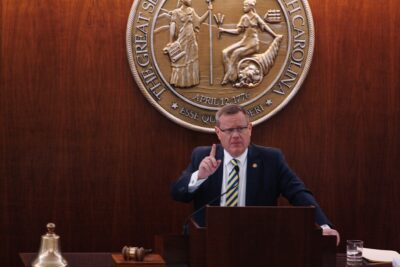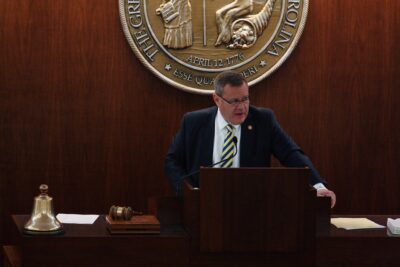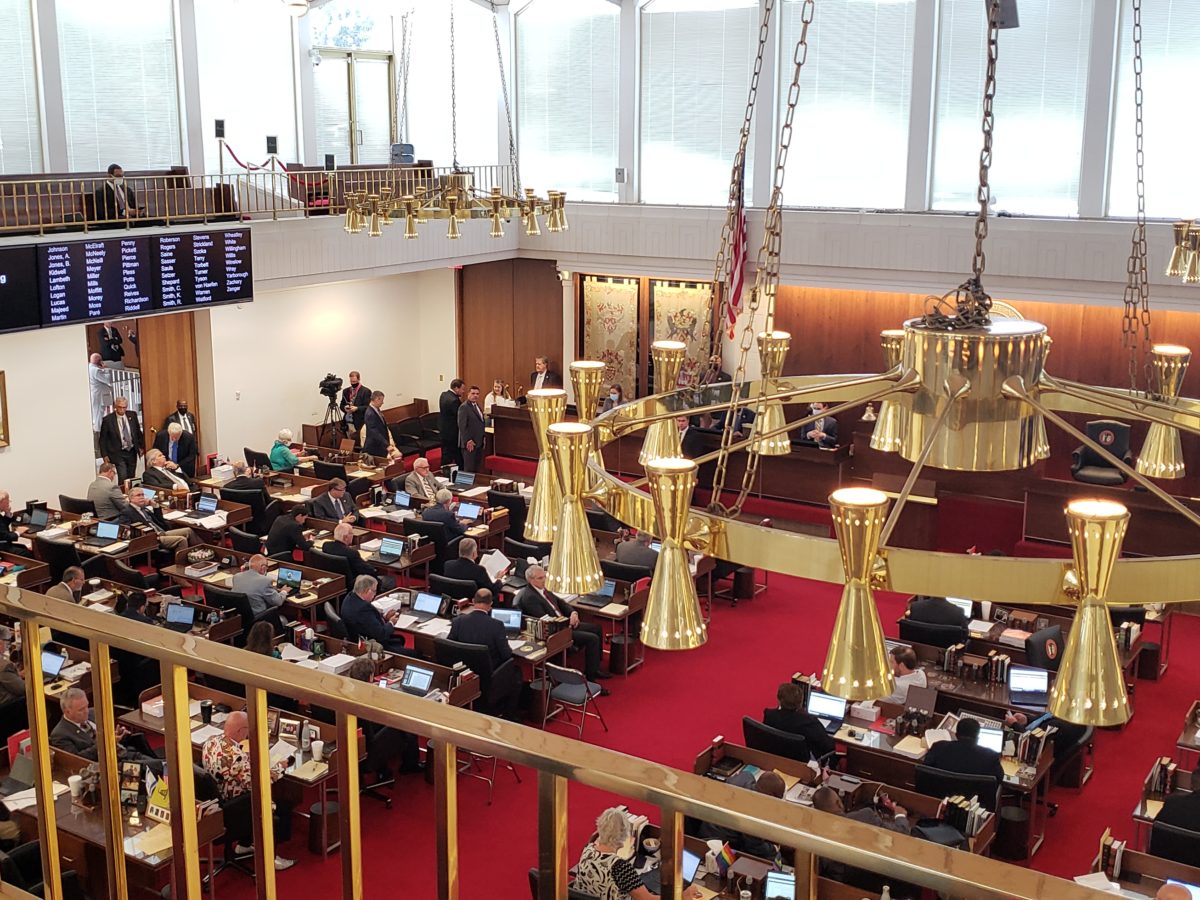

Share this story
- Teacher turnover has remained "roughly constant" since the General Assembly introduced state-funded bonus and supplement programs for teachers in 2016, the N.C. Fiscal Research Division told lawmakers.
- The N.C. Fiscal Research Division recently gave lawmakers a presentation on state-funded bonus and supplement programs introduced since 2016. Take a look at those programs here.
|
|
Teacher turnover has remained “roughly constant” since the General Assembly introduced state-funded bonus and supplement programs for teachers in 2016, N.C. Fiscal Research Division analyst Mary Schuler told lawmakers on Tuesday during a Joint Legislative Education Oversight Committee (JLEOC) meeting.
Take a look at that data below. The attrition rates highlighted by Schuler range from 8.7% in 2016-17 to 7.8% in 2021-22.
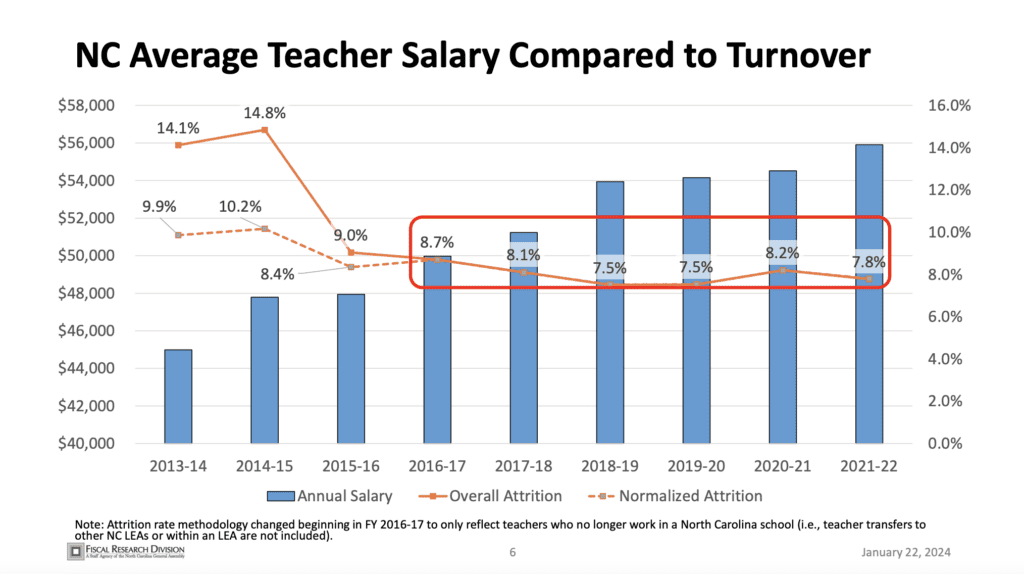

“What is not represented here is teachers moving between (districts) or between schools,” Schuler said.
In North Carolina, teachers are paid according to a base monthly salary schedule that increases based on years of experience. There are a number of supplements that can go on top of that base amount. You can view the updated salary schedules for 2023-24 on DPI’s website.
A National Education Association report from last April ranks North Carolina 36th in the nation for average teacher salary and 46th for average teacher starting salary. Beginning teacher pay will reach $41,000 by the end of the 2024-25 fiscal year. Average teacher pay is set to increase to over $59,000 by the end of the biennium, Republican lawmakers previously said.
However, the State Board of Education and teachers have said that many educators make far less than that average amount, which includes at least 12 years of experience and local salary supplements that vary widely by district.
Here is a look at state-funded supplements to the base salary schedule. The bolded items are the ones Schuler focused on during her presentation.
- Graduate degrees required for licensure. North Carolina no longer automatically pays teachers extra for having a master’s degree, unless the position requires that degree.
- National Board certification: Teachers with National Board certification receive a 12% salary supplement.
- Higher schedule placement plus an additional $350/month for school psychologists, speech pathologists, and audiologists.
- School counselors receive an additional $100/month.
- Bonuses for certain test scores or EVAAS growth scores.
- Advanced Teaching Roles.
- Working in smaller or lower-wealth counties.
“These subjects… are just a few dimensions of the many that are related to total teacher compensation,” Schuler said.
Though Schuler did not focus on locally funded supplements, most districts also provide a supplement on top of the state-funded salary — though this varies widely across the state. Some districts may also provide small supplements for extra duties, according to the Fiscal Research Division’s presentation.
You can view the history of legislative increases from 1992 to the present on the Office of State Human Resource’s website. You can also read about the budget’s supplements outlined for educators at this EdNC article.
Here’s a closer look at the bonuses and supplements Schuler discussed. Below, you can find a breakdown of the nearly $255 million in state funds appropriated for state-funded bonus and supplement programs in the 2023-24 fiscal year. Those funds make up about 3.5% of state-funded teacher pay, Schuler said.
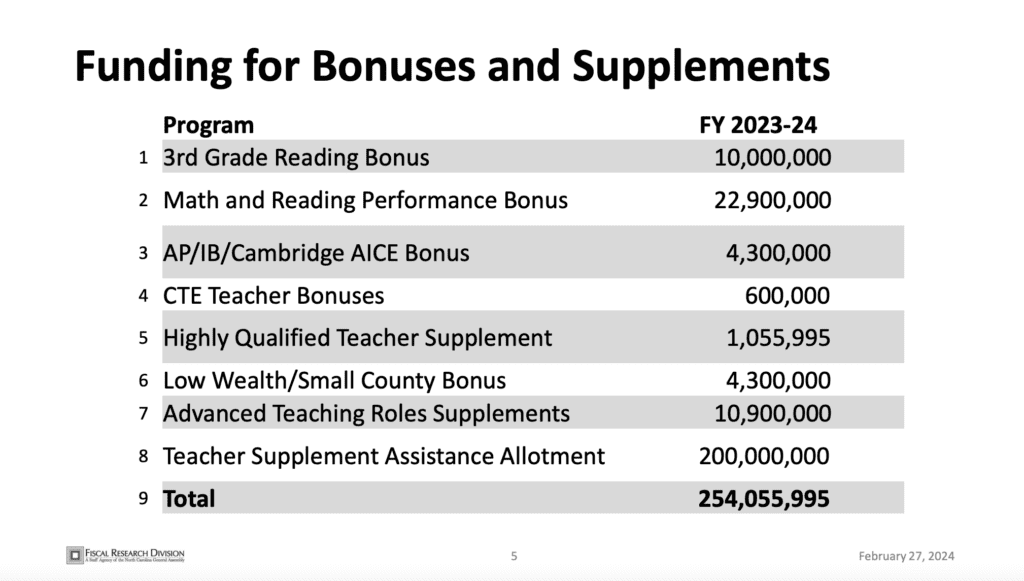

Math and reading bonuses
The third grade reading bonus was first established in 2016 and awards teachers based on EVAAS student growth scores.
In fiscal year (FY) 2023-24, the budget allocated $10 million for the program — $5 million for the top 25% of teachers statewide and $5 million for the top 25% of teachers in each district.
In FY 2022-23, the state bonus was $3,489.00 ($3,241.06 bonus payment plus $247.94 for social security).
Local bonuses are determined based on the number of eligible teachers at the state level. At the local level, the Department of Public Instruction (DPI) allocates funding to school districts based on Average Daily Membership (ADM), which is a measure of enrollment. At that point, districts must distribute the allocation equally among qualified teachers.
A teacher can receive both state- and local-level bonuses.
That bonus was expanded to fourth-fifth grade reading and fourth-eighth grade math in 2017. The FY 2023-24 budget allocated $22.9 million to those programs.
That bonus awards $2,000 to teachers in the top 25% in the state or top 25% of their district, according to the Fiscal Research Division’s presentation.
CTE and advanced course bonuses
The state also implemented a bonus for Career and Technical Education (CTE) in 2016.
Under this program, teachers receive a bonus of $25 or $50 per student receiving an industry certification or credential, depending on the value ranking. You can view those rankings in the most recent report to the General Assembly on the CTE Industry Certifications and Credentials Teacher Bonus Program.
In 2016, the state also implemented bonuses for advanced courses, including Advanced Placement (AP), International Baccalaureate (IB), and Cambridge AICE.
This program gives teachers a bonus of $50 per student who received a qualifying score on an advanced course exam. Those qualifying scores include:
- A three or higher on AP exams.
- A four or higher on IB exams.
- An E or higher on Cambridge AICE exams.
Teachers of CTE and advanced courses can receive up to $3,500 in bonuses per year.
Low-wealth and small county bonuses
In FY 2023-24, the budget allocated $4.3 million for low-wealth and small county teaching bonuses. This program was established in 2021.
This bonus — which varies across the state — gives a signing bonus for teachers in eligible counties.
The state allocates up to $1,000 per teacher, and requires a 1:1 local match in funding. This means teachers can receive up to $2,000 signing bonus.
Highly qualified and Advanced Teaching Roles supplements
In 2017, the state established a Highly Qualified Teacher Supplement, which is available to new teachers graduating from approved North Carolina programs. Eligible teachers must also meet GPA and teaching assessment requirements.
Under this program, eligible new teachers can receive up to three step increases on the base salary schedule. Teachers at low-performing schools receive three steps on the schedule, and Exceptional Children and STEM teachers receive two steps. All other eligible teachers receive an extra step.
Schuler also discussed the Advanced Teaching Roles (ATR) Supplement, which was established last year.
That new supplement programs awards $10,000 per year to teachers designated as “Adult Leadership Teachers” in their district. A participating district can name up to 15% of its teachers as these leaders.
The ATR program also awards $3,000 annually for teachers designated as “Classroom Excellence Teachers,” which can make up 5% of teachers in each participating district.
You can view approved school districts on DPI’s website. You can read Best NC’s 2022 policy brief on the program here.
Teacher Supplement Assistance allotment
Schuler spent a large part of her presentation discussing the teacher supplement assistance allotment, which was first established in 2021. This allotment provides assistance for districts in providing a salary supplement to its teachers, and assistance is awarded based on a county’s tax base threshold.
The program’s stated goal is to help smaller counties be more competitive when it comes to teacher hiring.
“This program has a non-supplant requirement, which essentially means local effort for supplementing teacher pay is not supposed to decrease or be replaced by allocations from this program,” Schuler said.
Currently, four school districts are not eligible for the assistance based on the tax base threshold: Wake County Public Schools, Durham Public Schools, Guilford County Schools, and Charlotte-Mecklenburg Schools.
The most recent report to the General Assembly on the program also identified Buncombe County and Asheville City schools as being ineligible.
In FY 2023-24, the state allocated $200 million to this fund.
The formula for how the money is distributed is as follows: 65% of the formula is based on the county tax base, 25% on the county’s median household income, and 10% on the county’s effective tax rate.
Districts have flexibility to determine recipients, supplement amount, and timing, Schuler said.
However, the vast majority of eligible districts distributed their allotment equally across the board, she said.
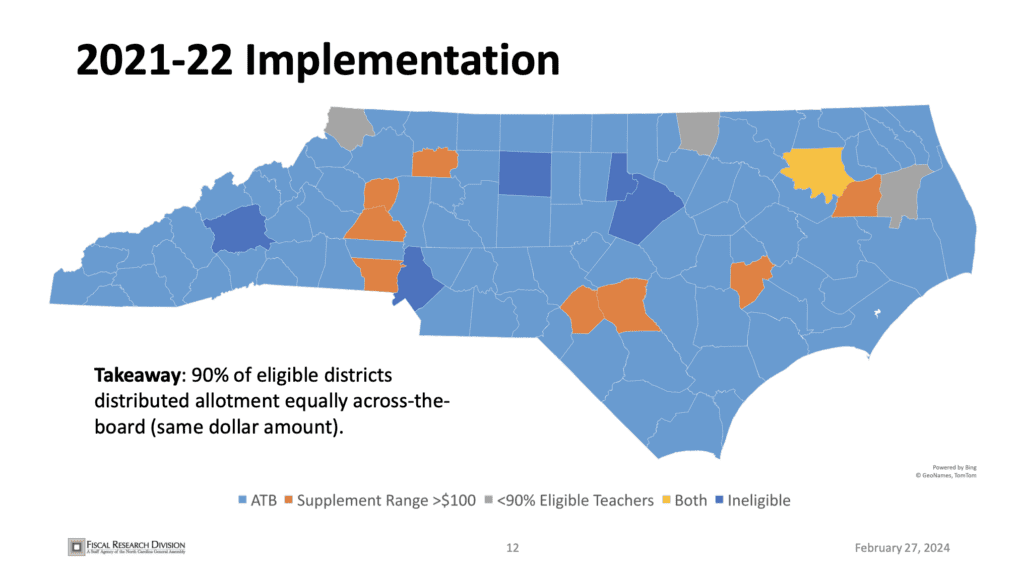

Future considerations for teacher supplements
Schuler posed a number of questions for lawmakers concerning future modifications to the Teacher Supplement Assistance allotment:
- Should districts have full flexibility in determining supplement amounts and recipients?
- Should districts be required to communicate what portion of a supplement is state-funded?
- Will employees accept the modifications?
Are the additional funds helping districts retain teachers? It is probably still too early to tell, Schuler said.
While 2022-23 data on implementation and attrition should be available in the next month or so, Schuler said attrition data tracks March to March. That time period likely won’t capture district supplements provided due to this program’s funds, she said.
“There really isn’t information yet to support one way or another whether this program is helping districts retain teachers in an individual district,” she said.





